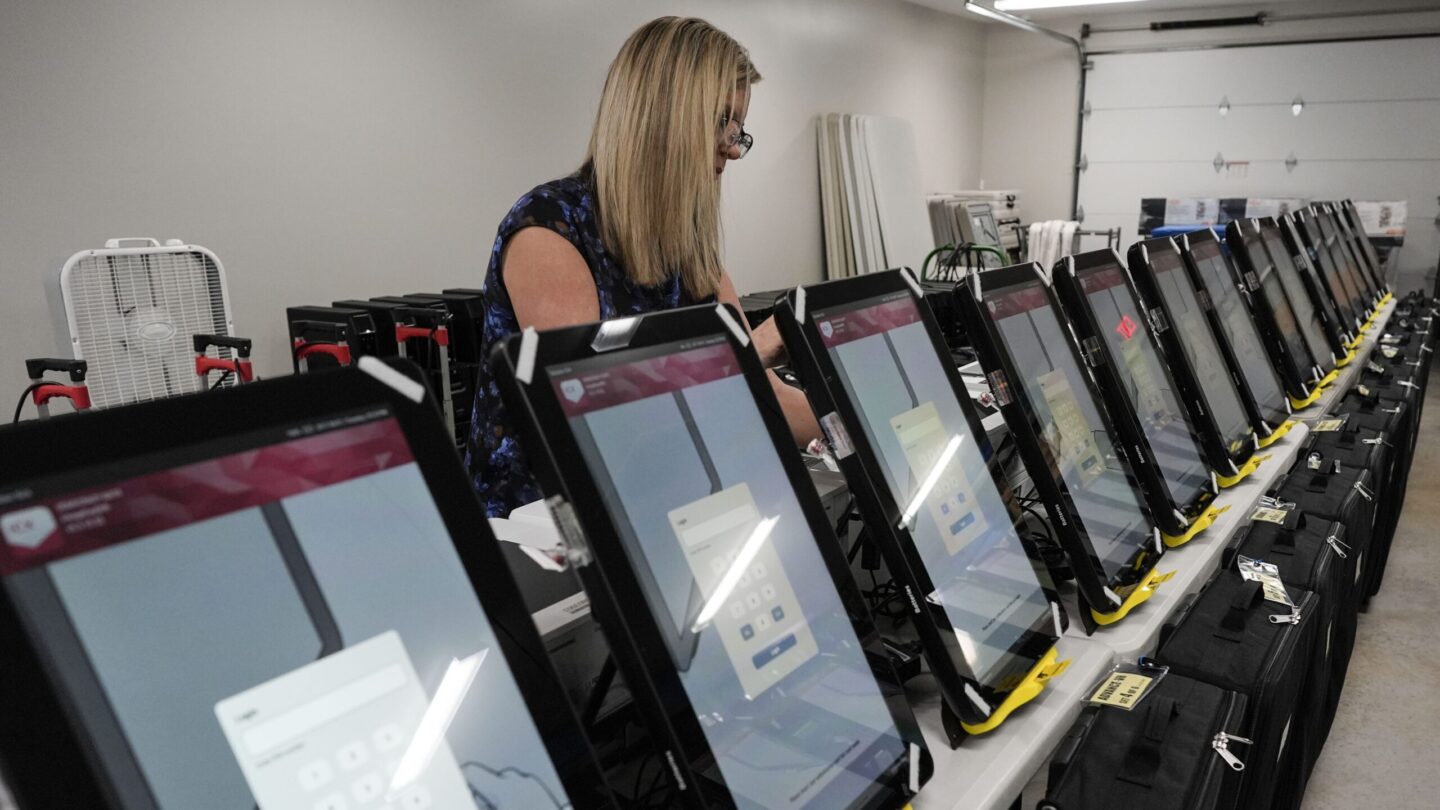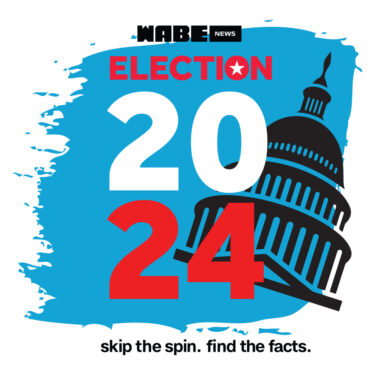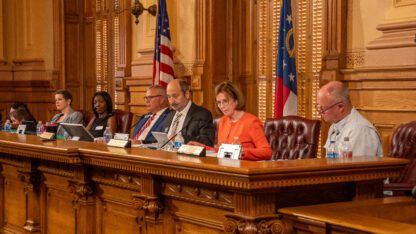Election experts in Georgia often ponder a major discrepancy – the gap between the security of the state’s election apparatus and the amount of trust some people have in it.
“I made this point back in 2020, when I went and watched an audit in our recount in Bartow County,” said Matt Mashburn, the former acting chair of the Georgia State Election Board. “What I said was the great paradox of our time is we have the most looked at, accessible, transparent, checked and rechecked election that’s ever been possible in Georgia’s history, and nobody believed it.”
Mashburn spoke as part of a series of bipartisan discussions on election protection at Georgia State University Tuesday, the first day of general election early voting in Georgia.
According to an NPR/PBS/Marist poll released this month, 58% of Americans are either concerned or very concerned that voter fraud will occur this year – even though 76% of Americans in the same poll said they are confident or very confident that their state and local governments will carry out a fair and accurate election.
It’s that second group that has the right idea, said Sarah Tindall Ghazal, a member of the state election board.
“Voter fraud is vanishingly rare,” she said. “That’s not to say that it doesn’t happen, it does on occasion. There are people who deliberately deceive election officials and try to vote where they’re not qualified. It is a handful of votes and a handful of voters. Every effort to track this has identified like 0.0001% of all of the votes cast are not valid. That’s not to say that mistakes don’t happen, because elections are run by humans.”
But Ghazal said there are layers of validation in place to ensure those mistakes are caught.
“It is impossible for wide-scale fraud to happen and it not to be caught and not to be called out, identified and investigated,” she said.
Gabriel Sterling, chief operating officer for Secretary of State Brad Raffensperger’s office, said some amount of skepticism of election results is baked into today’s partisan society.
“We can have very transparent elections, we can have fast results, we can have well-run systems; we can’t control one thing, everybody up here: who wins and who loses,” he said. “And the problem is, for a large swath of Americans, who wins and who loses is the only thing that matters. And if my guy lost, or my woman lost, there must be a lying sack of crap somewhere in here.
That’s what they believe, and there’s nothing we can do. As transparent as we are, there’s going to be people who make those claims, because the incentives are backwards right now in a lot of our systems. It’s unfortunate. And the partisanship has gotten very difficult.”
Sterling said Raffensperger’s office gets criticism from both sides, with those on the left claiming that officials remove voters from the rolls to suppress the vote and people on the right saying they purposely leave dead and departed voters on the lists so they can cast fake votes and steal elections.
Georgia State University political science professor Jennifer McCoy said several factors have caused voter confidence to plummet in recent decades.
“This is not new. This was not new with Donald Trump, as some people think,” she said. “It’s been growing. And for several reasons, it’s been growing. The first one, I would say, are the really major changes that we’ve seen in this country to our values and to the rights of different groups of people that in the past didn’t have those rights.”
McCoy named the Civil Rights movement and the fights for women’s and LGBTQ rights.
“Those kinds of new rights actually made some other people scared because they were afraid that as some people who had been more subordinated were coming up and getting more equal rights, that might take away the rights that the other groups, the more dominant groups, had.”
Adrienne Jones, a political science professor at Morehouse College, said some on the right have been cynically deploying arguments used by people in those movements.
“One way to do that is to undermine elections by sort of picking up this complaint that people of color have had, that they haven’t had equal access, or that the election systems have not been treating them fairly in states like Georgia, and then sort of running with that topic as if it is aimed against a Trump presidency, a potential Trump presidency,” she said.
“So raising the specter of voter fraud, which we know is not factual, and yet we see so much media support and belief around these ideas that the election isn’t going to be fair,” she added. “And that’s really important, combined with creating that racial tension that I think naturally, viscerally, in the United States, puts people at odds, and it makes it more difficult for them to see how much similarities average Americans have.”
Political divisiveness often sparks threats to real campaign workers and volunteers, said Akyn Beck, Floyd County elections supervisor.
“It is ridiculous that I am doing my silly little job in my silly little county, and I am being harassed for it, and what I’ve faced in my position is nothing compared to some of the other counties.”
Beck said she gets around 50 angry emails a day, and she’s not the only one who feels threatened.
“I think more than likely, we will lose a lot of good co-workers and a lot of good election officials, just because, honestly, none of us make enough to do this,” she said. “We keep Narcan in our office, I know a lot of counties do, because people were mailing fentanyl to election offices. Every single one of our precincts has to have an officer there. We have to do specialty training for Stop the Bleed and CPR because you just never know.”
Jones said partisan news sources, divisive rhetoric from politicians, close elections and the U.S.’s winner-take-all electoral system also help foment division, and the country could take a page out of other democracies’ books by adopting proportional representation, where districts receive multiple representatives based on the breakdown of votes, or ranked-choice voting, where voters assign candidates a ranking and results are determined after multiple rounds and eliminations.
“After this election, I hope that we’ll get an even bigger movement for election reform in this country and to move away from this winner-take-all system we have, where we elect just one person per district and so the half of the people in that district who may have voted for somebody else may feel like they have no voice at all, no representative,” she said.
Sterling said he is confident the free market of ideas will wind up with good leaders eventually.
“I think over time, voters will reward people, eventually, who are responsible actors, who defend the institutions and keep this 200-plus-year-old democracy, democratic republic, going,” he said.
This story was provided by WABE content partner the Georgia Recorder.










